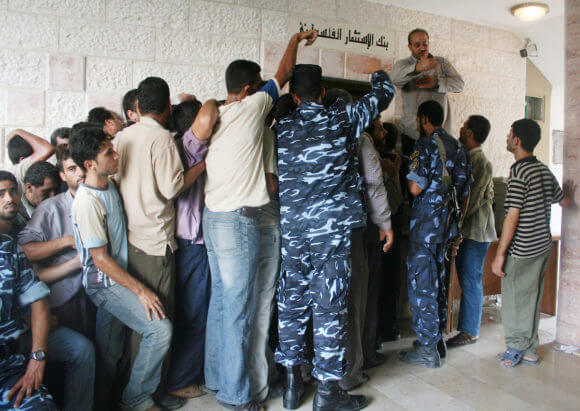Mohammed Abu Rukba was a rising academic at a local university. A prolific educator, he has authored more than 70 articles and four books, including one that is still taught in classrooms across Gaza. Yet for the last three years Abu Rukba has not lectured or taught. He told me in January every morning he opens his tobacco stale and sells cigarettes out of a glass case to make ends meet. Often his 12-year-old daughter Ghazal comes along. Abu Rukba cannot manage the cost of childcare.
“I’ve become like an expert in football matches, football players and their salaries. And, I am addicted to video games. I stopped reading books and I’ve lost my passion for history,” he tells me one January morning.
In 2012 Abu Rukba returned to Gaza from Cairo where he earned a doctoral degree in modern history from the Institute of Arab Research and Studies, a prestigious university opened by the Arab League. Getting a graduate degree was a mark of achievement. Abu Rukba is from the Jabalia refugee camp in northern Gaza.
“I insisted on returning to Gaza for two reasons,” Abu Rukba said. “First, I thought it would be easy for me to find a job when I return home because I have a Ph.D. and I have good capacities in the academic field, and second, I wanted to serve my people and country with my education but it seems that I’ll spend the rest of my life regretting this decision.”
“When I returned home, I was shocked by Gaza’s reality. I didn’t find a proper job that provided my family with a decent life, or deserving of the effort put into this degree.” he continued.
Initially, he was an adjunct professor at al-Azhar University in Gaza City, paid around the equivalent of $200 a month.
“I thought this was temporary and things would become better, but they only got worse and worse,” Abu Rukba lamented.
Three years ago Abu Rukba was laid off as universities across Gaza were facing financial uncertainty. At first, out of work, he stayed home and read, “but I had to find a way to support my family.”
He took on a series of odd jobs. He sold vegetables in an outdoor market at a boot owned by a neighbor, yet the business closed the same year. He took out a modest loan and opened the cigarette stand.
With spiking unemployment in Gaza, Abu Rukba is just one of many Palestinians with doctorate degrees who find themselves leaving academia for unemployment or underemployment. From a physician to an accountant, to an expert in criminal sociology, Mondoweiss spoke to series of Palestinian with post-graduate degrees earlier this year who incurred lengthy bouts of unemployment, and have struggled to find work in other industries.
The Palestinian Central Bureau of Statistics reports 52 percent of Palestinians between the age of 19 and 29 are unemployed. Of those who have at least one degree from an institution of higher education, 35 percent of men are unemployed and 68 percent of women are unemployed. Arguably, the figure is much higher in Gaza than in the West Bank, where Gaza’s overall unemployment is about twice as high. In addition, the United Nations found that 80 percent of Gaza’s residents receive some form of direct humanitarian assistance.
For those who do have jobs in Gaza, half work in the service industry.

Mahmoud Qeshta, 27, got a master’s degree in accounting last year. Rather than crunching numbers at a firm or preparing tax returns, he serves hookah at a popular lounge, Rotana coffee in the heart of Rafah city in southern Gaza. While smokey and cloudy, the lounge, locally referred to as a “coffee shop,” is decorated with wood panels and an overabundance of green plants, giving it a faux bucolic vibe.
Qeshta doesn’t usually talk while preparing hookah; he keeps a toothpick in his mouth that he uses to puncture an aluminum cover over the mouth of the water pipe where hot coals rest.
“Despite the fact that I never smoked hookah, I know the exact quantities needed to make the perfect hookah,” Qeshta told me, pulling the toothpick from the corner of his mouth, “I think excelling any profession just needs some time and exercise.”
“What pushed me to work in the coffee shop is not finding a job in any governmental or private organization. I’ve had to work in my relative’s shop to make a living especially after I got married in 2015.” Qeshta said.
Ahmad Garbou, a graphic designer, is a regular at the coffee shop. Garbou was shocked when he knew that Qeshta has a master’s.
“I have been going to this coffee shop for three years. I never expected that the man serving me hookah has a master’s. He’s very calm and we call him the hookah engineer because he prepares it very well,” Garbou said.
Many of Qeshta’s friends are still in school and they visit him regularly in the coffee shop.
“My friends don’t visit me to have a drink or take hookah but instead to help them in their courses,” Qeshta said.

The doctor-gatekeeper
For the last three years Muhammad al-Alem, 39, has been employed by a government-run agency affiliated with the Ministry of Social Development called the Spring Foundation for Juvenile Care. Despite having a doctorate in criminal sociology, the kind of degree that years ago could have cinched him a stable position at the foundation, he is not there to use his expertise. He is the gatekeeper, opening and closing the front entrance for children in the programs.
He receives $300 monthly.
“I feel that I’m dying slowly because of neglecting my rare scientific certificate,” Al-Alem told me.
In the summer of 2013, he returned to Gaza from Egypt with his degree.
“This specialty is rare in Gaza. I thought I would find a work opportunity on a platter of gold.” Al-Alem said
After spending a whole year unemployed and searching for a job with government ministries, nonprofits, and universities, al-Alem was hired by al-Azhar University as an adjunct professor. He was paid by the hour, no benefits, no job security.
“I worked for two semesters for the university. Each semester I received around $100. It wasn’t even enough to cover the transportation costs as I live at al-Buraij camp in the middle of Gaza, but I accepted the job,” he said.
Al-Alem explained to Mondoweiss the nature of his specialty examines the social dimensions around the individuals who commit crimes while documenting the economic and social trends behind criminal acts and in their aftermath.
After he was laid off from his teaching position he spent four depressed months at home. Al-Alem then decided to work in any job that enabled him to support his eight-member family.
He found a job as a construction worker earning the equivalent of $6.00 a day for a 12-hour shift. None of his co-workers have bachelor’s degrees.
“I didn’t have previous experience in the field of construction, but I decided to work and learn. I wanted to make a living,” he said.
Once Faiez al-Salmy, the contractor al-Alem worked for discovered his credentials, he gave him a nominal raise to $10.00 a day.
“We didn’t know that Muhammad has a Ph.D. When we knew, we felt ashamed. I couldn’t do anything to help him, but I increased his daily pay a little bit.”

The physician who fled
While many Palestinians with post-graduate degrees are able to find some form of underemployment, Gaza’s most highly specialized workforce is leaving.
Muhannad al-Hour, aged 35, is a surgeon from the al-Nusirat refugee camp. He left Gaza three months ago for Belgium, although the entire immigration process took him a whole year.
Al-Hour earned an MD in Jordan in 2011. He then worked in one of Gaza’s government hospitals under an annual contract.
“It was difficult to stay in Gaza, I wanted to find a job and live a life that’s appropriate for me as a surgeon.”
Ahmad Shatat, who heads doctors’ affairs in Gaza’s healthcare system said that 120 physicians across in all hospitals in Gaza have left the Palestinian territory since 2018.



For shame, israel…for shame!